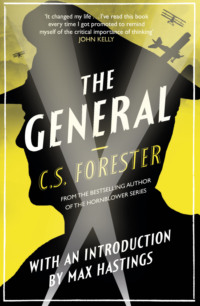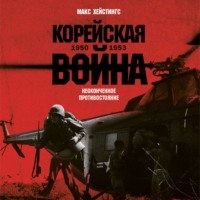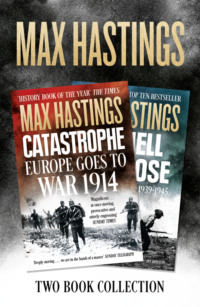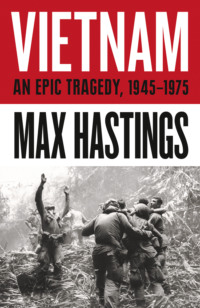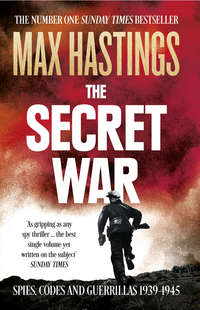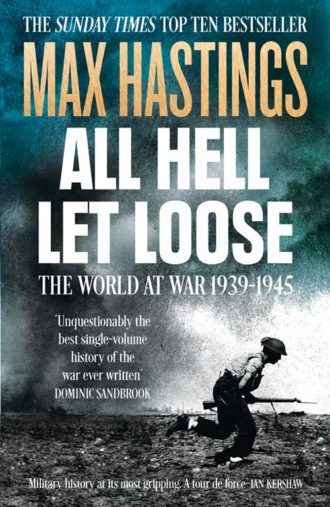
Полная версия
All Hell Let Loose: The World at War 1939-1945
On 7 September, ten French divisions moved cautiously into the German Saarland. After advancing five miles, they halted: this represented the sum of France’s armed demonstration in support of Poland. Gamelin was satisfied that the Poles could hold off Hitler’s Wehrmacht until the French rearmament programme was further advanced. Slowly, the Polish people began to understand that they were alone in their agony. Stefan Starzy


Exhaustion among men and horses soon posed the main threat to the headlong German advance. Cavalryman Lance-Corporal Hornes found his mount Herzog repeatedly stumbling: ‘I called out to the section commander – “Herzog’s had as much as he can take!” I had scarcely got the words out when the poor beast fell to his knees. We’d gone 70km on the first day, then 60 on the second. And on top of that, we’d had the trek over the mountains with the advance patrol galloping…That meant we’d gone nearly 200km in three days without any proper rest! Night had long fallen, and we were still riding.’
The horrors of blitzkrieg mounted: while Warsaw Radio played Chopin’s Military Polonaise, German bombing of the capital was now accompanied by the fire of a thousand guns, delivering 30,000 shells a day, which pounded its magnificent buildings into rubble. ‘The lovely Polish autumn [is] coming,’ fighter pilot Mirosław Feri


A counter-attack on 10 September by eight Polish divisions, across the Bzura river west of Warsaw, briefly disrupted the German offensive and took 1,500 prisoners. Kurt Meyer of the SS Liebstandarte acknowledged with mingled admiration and condescension: ‘The Poles attack with enormous tenacity, proving over and over again that they really know how to die.’ Contrary to legend, on only two occasions did Polish horsemen engage German tanks. One such episode took place on the night of 11 September, when a squadron hurled itself full gallop at the village of Kałuszyn, strongly held by the Germans. Out of eighty-five horsemen who attacked, only thirty-three afterwards rallied. The invaders used their own cavalry to provide reconnaissance and mobility, rather than for assaults. Lance-Corporal Hornes’s unit advanced in column, while two men rode ahead: ‘They would hurry at a gallop from one hill to the next, then wave the troop on. As another precaution, lone horsemen were sent out alongside us on the ridges of the hills. Suddenly, we saw new unfamiliar contours emerging from the thick dust-cloud: small, agile horses with bobbing heads, ridden by Polish Uhlans in their khaki uniforms, long lances held with one end in the stirrup leather and the other slung from the shoulder. Their shining tips bobbed up and down in time with the horses’ hooves. At the same moment, our machine-guns opened fire.’
The Wehrmacht was vastly better armed and armoured than its enemies. Poland was a poor country, with only a few thousand military and civilian trucks; its national budget was smaller than that of the city of Berlin. Given the poor quality and small number of Polish planes compared with those of the Luftwaffe, it is remarkable that the campaign cost Germany 560 aircraft. Lt. Piotr Tarczy

Amid popular rage against the invaders of their homeland, there were scenes of mob violence which conferred no honour upon Poland’s cause. Mass arrests of ethnic Germans – supposed or potential fifth columnists – took place throughout early September. At Bydgoszcz on ‘Bloody Sunday’, 3 September, a thousand German civilians were massacred after allegations that they had fired on Polish troops. Some modern German historians claim that up to 13,000 ethnic Germans were killed during the campaign, most of them innocents. The true figure is almost certainly much lower, but such deaths provided a pretext for appalling and systemic Nazi atrocities towards Poles, and especially Polish Jews, which began within days of the invasion. Hitler told his generals at Obersalzberg: ‘Genghis Khan had millions of women and men killed by his own will and with a light heart. History sees him only as a great state-builder…I have sent my Death’s Head units to the east with the order to kill without mercy men, women and children of the Polish race or language. Only in such a way shall we win the Lebensraum that we need.’
When the Wehrmacht entered Łód





Most young Germans, graduates of the Nazi educational system, unhesitatingly accepted the version of events offered by their leaders. ‘The advance of the armies has become an irresistible march to victory,’ wrote a twenty-year-old Luftwaffe flight trainee. ‘Scenes of deep emotion occur with the liberations of the terrorised German residents of the Polish Corridor. Dreadful atrocities, crimes against all the laws of humanity, are brought to light by our armies. Near Bromberg and Thorn they discover mass graves containing the bodies of thousands of Germans who have been massacred by the Polish Communists.’
On 17 September, the date on which Poles expected the French to begin their promised offensive on the Western Front, instead the Soviet Union launched its own vicious thrust, designed to secure Stalin’s share of Hitler’s booty. Stefan Kurylak was a thirteen-year-old Ukrainian Pole, living in a quiet village near the Russian border. Retreating Polish troops began to trickle down its dusty main street on foot and on horseback, some crying out urgently, ‘Run – run for your lives, good people! Hide anywhere you can, for they are showing no mercy. Hurry. The Russians are coming!’ Soon afterwards, the teenager watched a Soviet tank column clatter through the village: a child who lingered in its path, frightened and confused, was casually shot down. Kurylak took refuge in his family’s potato pit.
Vyacheslav Molotov, Stalin’s foreign minister, told the Polish ambassador in Moscow that, since the Polish republic no longer existed, the Red Army was intervening to ‘protect Russian citizens in western Belorussia and western Ukraine’. Although Hitler had agreed Stalin’s annexation of eastern Poland, the Germans were taken by surprise when the Soviet intervention came. So, too, were the Poles. Once the Red Army struck in their rear, wrote Marshal Rydz-

Hitler hoped that Stalin’s intervention would provoke the Allies to declare war on the Russians, and in London there was indeed a brief flurry of debate about whether Britain’s commitment to Poland demanded engagement of a new enemy. In the War Cabinet, only Churchill and war minister Leslie Hore-Belisha urged preparations for such an eventuality. Britain’s Moscow ambassador Sir William Seeds cabled: ‘I do not see what advantage war with the Soviet Union would be to us although it would please me personally to declare it on Molotov.’ Much to the relief of prime minister Neville Chamberlain, the Foreign Office advised that the government’s guarantee to Poland covered only German aggression. Bitter British rhetoric was unleashed against Stalin, but no further consideration was given to fighting him; the French likewise confined themselves to expressions of disgust. Within days, at a cost of only 4,000 casualties, the Russians overran 77,000 square miles of territory including the cities of Lwów and Wilno. Stalin gained suzerainty over five million Poles, 4.5 million ethnic Ukrainians, one million Belorussians and one million Jews.
In Warsaw, starving people still clung to hopes of aid from the west. An air-raid warden confided to an acquaintance: ‘You know the British. They are slow in making up their minds, but now they are definitely coming.’ Millions of Poles were at first bewildered, then increasingly outraged, by the passivity of these supposed friends. A cavalry officer wrote: ‘What was happening in the west, we wondered, and when would the French and British start their offensive? We could not understand why our allies were so slow in coming to our assistance.’ On 20 September, Poland’s London ambassador broadcast to his people at home: ‘Fellow countrymen! Know that your sacrifice is not in vain, and that its meaning and eloquence are felt to the utmost here…Already the hosts of our allies are assembling…The day will come when the victorious standards…shall return from foreign lands to Poland.’ Yet even as he spoke, Count Raczy

In Paris, Polish ambassador Juliusz Łukasiewicz exchanged bitter words with French foreign minister Georges Bonnet. ‘It isn’t right! You know it isn’t right!’ he said. ‘A treaty is a treaty and must be respected! Do you realise that every hour you delay the attack on Germany means…death to thousands of Polish men, women and children?’ Bonnet shrugged: ‘Do you then want the women and children of Paris to be massacred?’ American correspondent Janet Flanner wrote from Paris: ‘It would seem, indeed, as if efforts are still being made to hold the war up, prevent its starting in earnest – efforts made, perhaps self-consciously, by government leaders reluctant to go down in history as having ordered the first inflaming shots, or efforts made as a general reflection of the various populations’ courageous but confused states of mind. Certainly this must be the first war that millions of people on both sides continued to think could be avoided even after it had officially been declared.’

The Polish Campaign
The French were wholly unwilling to launch a major offensive against the Siegfried Line, as Winston Churchill urged, far less to invite German retaliation by bombing Germany. The British government similarly declined to order the RAF to attack German land targets. Tory MP Leo Amery wrote contemptuously of prime minister Neville Chamberlain: ‘Loathing war passionately, he was determined to wage as little of it as possible.’ The Times editorialised in a fashion which seemed to Polish readers to mock their plight: ‘In the agony of their martyred land, the Poles will perhaps in some degree be consoled by the knowledge that they have the sympathy, and indeed the reverence, not only of their allies in western Europe but of all civilized people throughout the globe.’
It is sometimes argued that in mid-September 1939, with the bulk of the German army committed in Poland, the Allies had an ideal opportunity to launch an offensive on the Western Front. But France was even less prepared psychologically than militarily for such an initiative; and Britain’s small expeditionary force, still in transit to the Continent, could contribute little. The Germans could probably have repelled any assault without much disrupting their operations in the east, and the inertia of the French and British governments reflected the will of their peoples. A Glasgow secretary named Pam Ashford wrote in her diary on 7 September: ‘Practically everyone thinks the war will be over in three months…Many hold that when Poland is smashed up there won’t be much point in continuing.’
The Poles should have anticipated the passivity of their allies, but its cynicism was breathtaking. A modern historian, Andrzej Suchcitz, has written: ‘The Polish government and military authorities had been double-crossed and betrayed by their western allies. There was no intention of giving Poland any effective military support.’ As Warsaw faced its doom, Stefan Starzy

And he, when the city was just a raw, red mass
Said: ‘I do not surrender.’ Let the houses burn!
Let my proud achievements be bombed into dust.
So what, if a graveyard grows from my dreams?
For you, who may come here, some day recall
That some things are dearer than the finest city wall.
By the end of the campaign’s third week, Polish resistance was broken. The capital remained unoccupied only because the Germans wished to destroy it before claiming the ruins; hour after hour and day after day, merciless bombardment continued. A nurse, Jadwiga Sosnkowska, described scenes at her hospital outside Warsaw on 25 September:
The procession of wounded from the city was an unending march of death. The lights went out, and all of us, doctors and nurses, had to move about with candles in our hands. As both the operating theatres and the dressing stations were destroyed the work was done in the lecture rooms on ordinary deal tables, and owing to the lack of water the instruments could not be sterilised, but had to be cleansed with alcohol…As human wreckage was laid on the table the surgeon vainly attempted to save the lives that were slipping through his hands…Tragedy followed tragedy. At one time the victim was a girl of sixteen. She had a glorious mop of golden hair, her face was delicate as a flower, and her lovely sapphire-blue eyes were full of tears. Both her legs, up to the knees, were a mass of bleeding pulp, in which it was impossible to distinguish bone from flesh; both had to be amputated above the knee. Before the surgeon began I bent over this innocent child to kiss her pallid brow, to lay my helpless hand on her golden head. She died quietly in the course of the morning, like a flower plucked by a merciless hand.
Professional soldiers can seldom afford to indulge in emotionalism about the horrors of war, but posterity must recoil from the complacency of Germany’s generals about both the character of their national leader, and the murderous adventure in which they had become his accomplices. Gen. Erich von Manstein is widely regarded as the finest German general of the war; afterwards, he took pride in pretensions to have done his part as an officer and gentleman. However, his writings during the Polish campaign, as well as later, reveal the insensitivity characteristic of his caste. He was delighted by the invasion: ‘It’s a grand decision of the Führer in view of the attitude of the Western Powers up till now. His offer to solve the Polish question was so obliging that England and France – if they really wanted peace – should have pushed Poland into accepting.’ Soon after the campaign began, Manstein visited a formation which he himself had recently commanded: ‘It was touching to see the staff so pleased when I suddenly appeared…Cranz [his successor] told me it was a pleasure to command such a well-trained division in war.’
In a letter to his wife, Manstein described his personal routine during the campaign, in which he served as von Rundstedt’s chief of staff at Army Group South: ‘I get up at 6.30, plunge into the water [for a swim], into the office by 7.00. Morning reports, coffee, then work or trips with R[undstedt]. Midday, field kitchens here. Then half an hour break. In the evening after supper, which we eat together with the general staff officers as at lunch, the evening reports come in. And so it goes on to 11.30.’ The contrast is stark, between the serenity of army headquarters and the vast human tragedy its operations had precipitated. Manstein signed an order for the German forces encircling Warsaw to fire upon any refugees who attempted to leave: it was deemed easier to force a swift outcome of the campaign, and to avoid a battle in the streets, if the inhabitants were unable to escape the capital’s bombardment. Yet he was a man of such personal fastidiousness that he sometimes quit rooms in which von Rundstedt was speaking, because he recoiled from his chief’s obscene language. On 25 September, he basked in a congratulatory visit from Hitler, writing to his wife: ‘It was nice to see how the soldiers rejoiced everywhere as the Führer drove past.’ In 1939, the officer corps of the Wehrmacht already displayed the moral bankruptcy that would characterise its conduct until 1945.
A Polish cavalry officer, Klemens Rudnicki, described the plight of his regiment and its beloved mounts in Warsaw on 27 September, the last night before the city fell: ‘Red, glittering flames illuminated our horses, standing quiet and motionless along the walls of the Łazienki Park, resembling saddled skeletons. A few were dead; some were bleeding, exposing huge, gaping wounds. Kowalski’s horse Cenzor was still alive, but lay with his bowels ripped out. Not long ago he had won the Army’s Challenge Cup at Tarnopol. He had been our pride. A shot in the ear ended his sufferings. Next day, probably, somebody needing to assuage his hunger would cut a joint from his loins.’
Warsaw capitulated on 28 September. Little Captain Krysk of Rudnicki’s 3rd squadron declared emotionally that he rejected the order: ‘Tomorrow morning we shall charge the Germans to preserve the regimental tradition that the 9th Lancers never surrender.’ Rudnicki dissuaded him; together, the regiment’s officers secreted their colours in the church of St Anthony on Senatorska Street, the only building still intact amid acres of rubble. Rudnicki reflected ruefully that the Polish army should have deployed in depth for a protracted defensive action, instead of manning a weak forward line that was certain to be broken. This, however, would have been ‘at variance with our natural aspiration – and with our military traditions and hopes of becoming a great Power’.
On 29 September the Modlin army north of Warsaw surrendered to the Germans, who took 30,000 prisoners. Organised resistance petered out, the Hel peninsula falling on 1 October; the last recorded engagement took place at Kock, north of Lublin, on the 5th. Hundreds of thousands of men fell into German hands, while many more struggled to flee. Young flier B.J. Solak was moved to encounter an air force colonel sitting beneath a tree, tears pouring down his face. Feliks Lachman was one of many Poles whose thoughts reverted to their recent reading of Gone with the Wind. Fleeing his home, he mused: ‘Desolate as was the Tara estate, Scarlett O’Hara was going through fire and water to the place where she knew she belonged. We had left, once and forever, men and things that formed the social, intellectual and emotional environment of our life. We were moving in a vacuum, aimlessly.’ After an air raid on the city of Krzemieniec, Adam Kruczkiewicz saw in the street a hysterical old Jew, ‘standing over the corpse of his wife…uttering a string of curses and blasphemies, shouting “There is no God! Hitler and the bombs are the only gods! There is no grace and pity in the world!”’
A few Polish cavalry units made good their escape into Hungary, where they surrendered their arms. At the barracks of the 3rd Hungarian Hussar Regiment, exhausted fugitives were moved to find themselves greeted by the unit’s officers, led by the elderly Colonel von Pongratsch, drawn up in full ceremonial uniform. A few days later, when the Poles left to face internment, the bewhiskered veteran embraced each one before bidding them farewell. Such old-world courtesies were welcome, because they had been banished from the pitiless universe of which most Poles now found themselves inhabitants.
Gen. Władysław Anders led his exhausted and depleted unit eastwards to escape the Germans. The men sang as they urged on their emaciated horses amid a throng of refugees and military stragglers. Then they met the Red Army, and Anders sent a liaison officer to the local Soviet headquarters to beg safe passage to the Hungarian border. The Pole was stripped of all he had, and threatened with execution. Russian guns began to shell the Polish positions. Anders ordered his men to split into small groups and find their own way into Hungary. He himself, badly wounded, was captured along with many others. A Russian officer told him complacently: ‘We are now good friends of the Germans. Together we will fight international capitalism. Poland was the tool of England, and she had to perish for that.’


